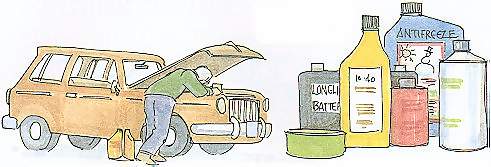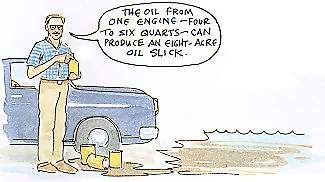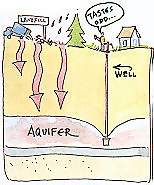 |
||
    |
||
|
Finally…
|
The only recommended way to dispose of oil is to put it into a sturdy container and take it to your neighborhood automotive garage or oil recycling center. Recycling one gallon of used oil yields two and one-half quarts of high quality lubricating oil, the same amount produced from 42 gallons of crude oil. Call 1-800-RECYCLE for recycling locations near your home. Disposing of antifreeze is also a problem. Antifreeze contains ethylene glycol which is poisonous to fish, wildlife and people. Many cats and dogs have died after drinking the sweet tasting puddles of antifreeze left on driveways. Do not dispose of antifreeze down storm drains, instead ask you local service station to add the liquid to their used anti-freeze storage drum. If your household is connected to a central sewer system, call your wastewater utility for specific guidance in disposing of anti-freeze. |
|
|





 Take
a few minutes to examine your car carefully for leaks in oil,
fuel, brake, and cooling systems. It is important to correct leaks
quickly, even a small leak over a long period can make a substantial
contribution of hazardous wastes to the environment. While you’re
at it, have your emission system checked for efficient operation.
When washing your car, use soap or clear water rather than detergents
to minimize runoff into storm drains.
Take
a few minutes to examine your car carefully for leaks in oil,
fuel, brake, and cooling systems. It is important to correct leaks
quickly, even a small leak over a long period can make a substantial
contribution of hazardous wastes to the environment. While you’re
at it, have your emission system checked for efficient operation.
When washing your car, use soap or clear water rather than detergents
to minimize runoff into storm drains.